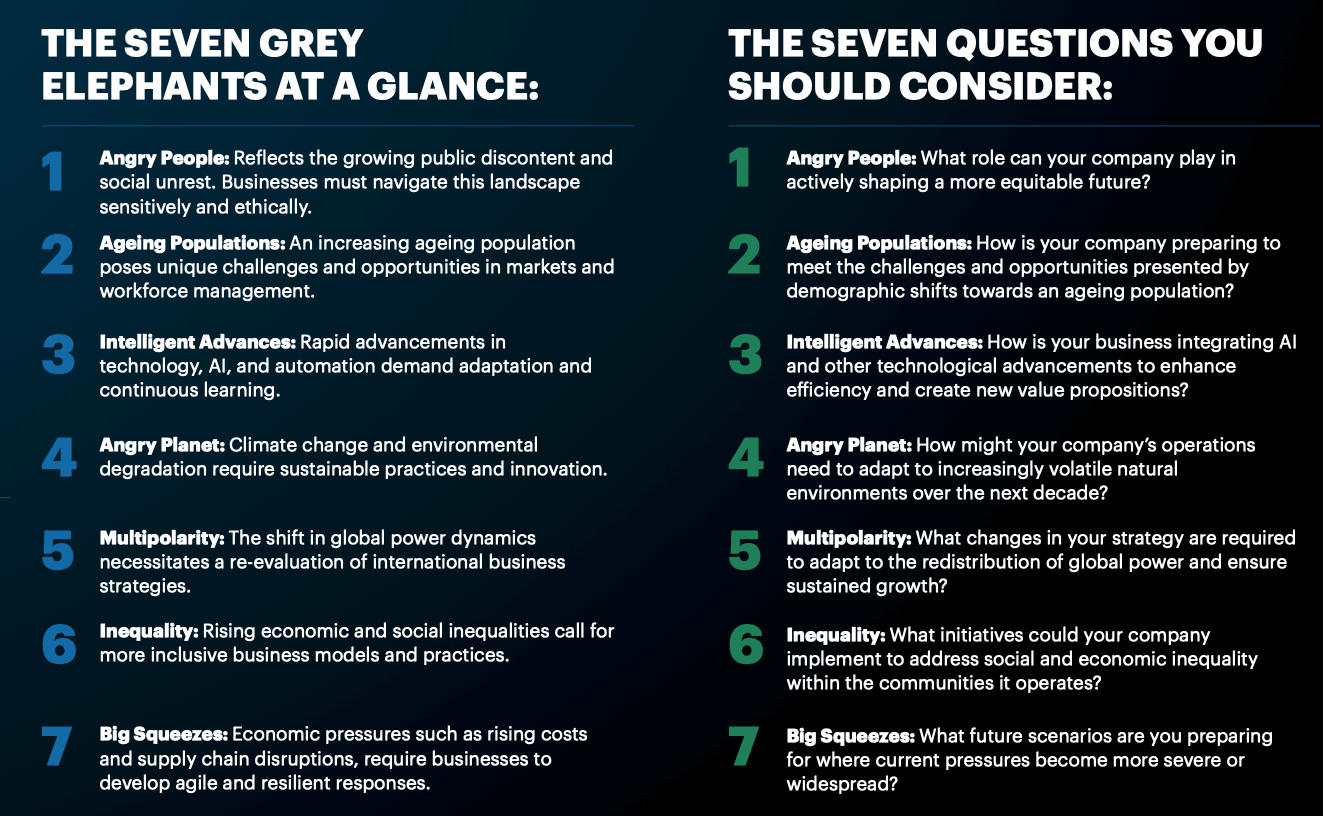Today’s insights are brought to you by my colleague and global futurist, Graeme Codrington.
In the modern business landscape, the future isn’t just an horizon to approach, it’s a canvas to co-create. And one of the things you can do as a futurist is to look for the big, disruptive forces that are somewhere on the horizon that are going to change everything.
At TomorrowToday we believe that, right now, it’s also important to recognise the ‘elephants that are already in the room’. In fact, our research makes us believe that certain mega-trend, forces of change are already here: the 7 Grey Elephants.
‘Grey elephants’ are defined as significant yet often overlooked forces of change that have far-reaching implications. They represent major socio-economic, environmental, and technological trends that are visible but often ignored by businesses and society.
These are massive disruptive forces that have the potential to completely change the way that the world works, to shift the rules for success and failure in every sector of society, in your industry, in your business, and in the work that you do. But these trends are, at the moment, at least, quite overlooked.
It’s not that you haven’t heard of them. It’s not that you don’t know what they are. The problem is that many businesses and organisations are simply not taking these forces very seriously.
Recognising these Grey Elephants as forces of change to pay close attention to is vital for future-proofing businesses and staying ahead in a competitive environment. They are crucial for strategic planning in a rapidly evolving global landscape.
These significant trends like public discontent, technological advancements, and climate change loom large and they hold not just challenges, but also uncharted opportunities for forward-thinking leaders.
Here’s a brief breakdown of the 7 ‘grey elephants’ and a starting question to consider in reference to each trend.

At TomorrowToday we work to empower businesses to not just navigate these Grey Elephants, but to harness their transformative potential and to design resilient, adaptable strategies that shape and create one’s own destinies. If you want to read a more in-depth breakdown of each of these mega-trends, you can visit our website or listen to Episode 1 of The TomorrowToday Podcast.
In the first episode of our podcast, global futurists and co-hosts, Graeme Codrington and Buhle Dlamini, delve into the grey elephants in more depth and expand on why it is so powerful for leaders to reframe how they are thinking about disruption and change.
They discuss how necessary it is to apply an opportunity mindset to organisational problem solving and how by incorporating an awareness of grey elephants into your strategic planning, you will be able to seize your own Kairos moment – anticipate challenges, seize opportunities, and remain resilient in the face of change.
Some additional questions to prompt your team and leaders:
- Are you effectively monitoring these transformative forces?
- How is your organisation preparing to adapt and thrive amidst these changes?
- What are some of the disruptions you have noticed but have not paid very close attention to?
- Which of these significant forces might be currently overlooked by your organisation?
- How can you harness these grey elephants into strategic opportunities for growth and innovation?
Contact us to discuss how your organisation can turn these challenges into avenues for growth and innovation.
Graeme Codrington is an internationally recognised futurist, specialising in the future of work. He helps organisations understand the forces that will shape our lives in the next ten years, and how we can respond in order to confidently stay ahead of change.
For the past two decades, Graeme has worked with some of the world’s most recognised brands, travelling to over 80 countries in total, and speaking to around 100,000 people every year. He is the author of 5 best-selling books, and on faculty at 5 top global business schools.


